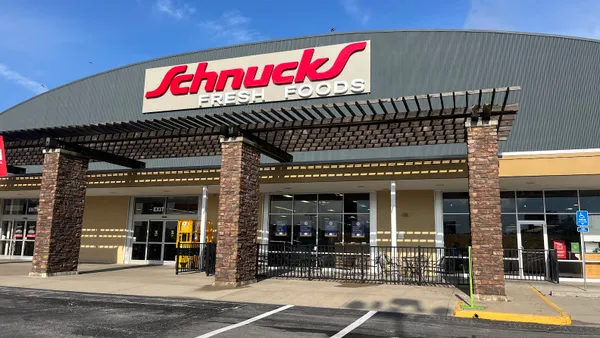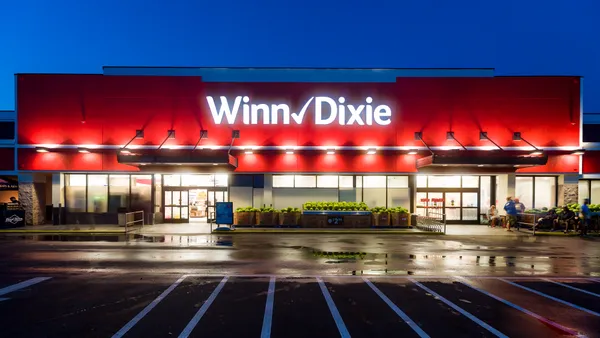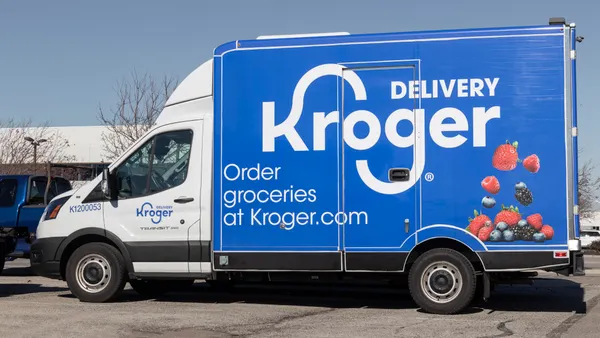Dive Brief:
- Albertsons’ identical-store sales rose 34% for the first eight weeks of its first financial quarter, covering the dates of Feb. 25 to April 25, the company announced Thursday. Store identical sales growth declined from 47% in March to 21% in April, but e-commerce sales growth picked up the pace as the pandemic drove more shoppers online. Albertsons’ digital sales rose 243% during the two-month period.
- For the fourth quarter ended Feb. 25, Albertsons reported identical-store sales growth of 1.8%, marking the company’s ninth straight quarter of ID sales gains. Digital sales grew 32% in Q4 while adjusted EBITDA was $756 million, slightly ahead of company projections. For fiscal year 2019, Albertsons recorded ID sales growth of 2.1% and adjusted EBITDA of $2.8 billion. The company reduced its net leverage to 2.9X, from 3.5X in fiscal 2018.
- CEO Vivek Sankaran said the grocer still plans to go through with its public offering at some point in the near future. “We will be watching the markets to determine the right time for our initial public offering,” he said during Thursday’s earnings call.
Dive Insight:
If and when Albertsons makes its push onto the public markets, it’s going to need to show investors that it can grow and attract new shoppers over the long run. Building out a strategy to capitalize on booming e-commerce sales during the pandemic could be just the ticket.
Sankaran said Albertsons has adjusted quickly to the online shift and will continue to move rapidly. Many of the shoppers that have used Albertsons’ pickup and delivery services in recent weeks are new to the company.
“The rate of [e-commerce] growth will be higher than pre-COVID. We’re investing in labor, in technology,” he said. “We have the plans, now it’s a matter of accelerating those investments commensurate with the growth we’re seeing.”
Albertsons, like many retailers, was overwhelmed with online demand in March. The main bottleneck was labor, Sankaran said. The company stepped up hiring, including funneling workers from 35 non-grocery companies, and quickly moved more than 55,000 workers into its stores and distribution centers and behind the wheels of its delivery trucks. The primary hiring push in March was getting more order pickers and delivery drivers.
Albertsons offers home delivery nationwide via its own workers as well as Instacart shoppers. In the coming months, the grocer plans to accelerate its expansion of stores with its click-and-collect service, known as Drive Up & Go. Around 600 stores — roughly a fourth of the entire company’s fleet — currently offer the service, and Albertsons plans to bring a minimum of 500 locations online this year, possibly as many as 1,000. Right now the company’s goal is to have 1,600 Drive Up & Go locations operational by the end of next year.
Albertsons’ click-and-collect footprint is smaller than that of competing retailers like Kroger, Target and Walmart, and could mean it loses out on shoppers in the months ahead. But the company is playing the long game when it comes to omnichannel sales. It’s currently piloting micro-fulfillment centers in two stores and automating various other processes like order fulfillment and inventory management. Albertsons also continues to build out its private label selections, with more than 900 new products introduced over the course of fiscal 2019. Own brands now account for 25.4% of the grocer’s total sales.
Sankaran said Albertsons’ Just for U loyalty program signups increased 70% in the first two weeks of Q1. The company pulled back on Just for U offers as out-of-stocks became an issue, but it’s reintroducing promotions as the supply chain improves. Stock levels overall are strong, Sankaran said, noting fresh produce levels have normalized in the past few weeks.
“I don’t think there’s reason for anyone to panic on supply,” he said.
Albertsons has introduced numerous safety procedures inside its stores and to its e-commerce services, including stepping up store cleaning, providing frontline employees with masks, limiting store capacity and instituting contactless home delivery. While many workers around the country remain on edge, with some staging walkouts, turnover at Albertsons has actually declined during the pandemic, Sankaran said.
Albertsons de-levered its balance sheet by $2 billion in fiscal 2019, bringing its debt-to-EBITDA ratio to 2.9X. The company filed for an IPO in March but has held off going public as the pandemic swept across the country. The delay has led to questions over whether the chain will see yet another public push scuttled, but the high sales volumes and inflow of new customers could end up putting it in stronger position for a stock market listing.









